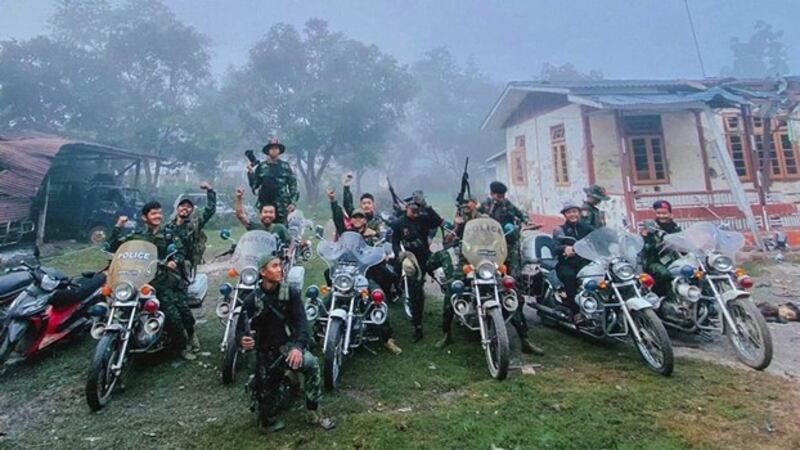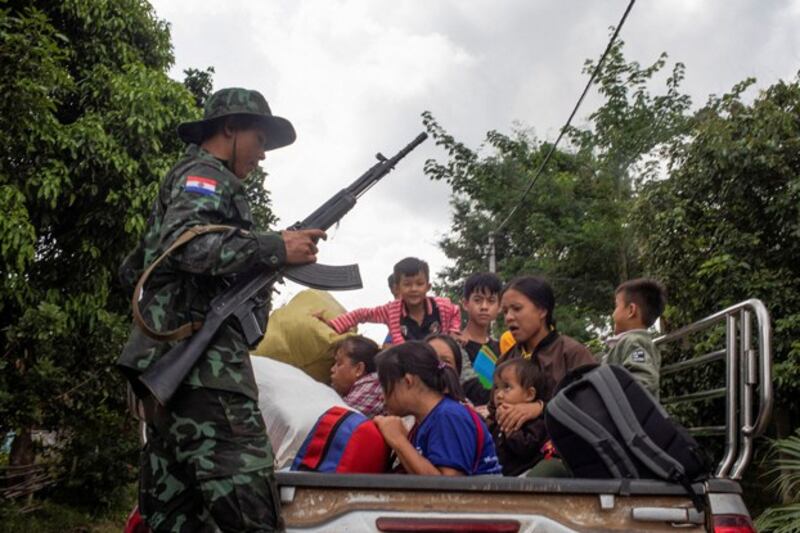Myanmar’s military junta and the Three Brotherhood Alliance held talks earlier this week about reducing armed conflict in northern Shan state, but failed to agree to meet each other’s demands, officials from one of the alliance’s ethnic armies said.
The Arakan Army (AA), Myanmar National Democratic Alliance Army (MNDAA), and the Ta’ang National Liberation Army (TNLA) formed the alliance in June 2019, and gained prominence in fighting junta soldiers following the February 2021 military coup.
The alliance has captured several cities and border hubs crucial for trade with China, as well as several junta military positions over the last few months in an offensive known as Operation 1027 in northern Shan state.
Regime forces have tried to regain the upper hand by launching artillery and air strikes.
The fighting has resulted in the deaths of more than 130 civilians, displaced nearly 100,000 people, and disrupted border trade with neighboring China, according to officials of the Shan Human Rights Foundation.
The Chinese-brokered talks in Kunming, capital of China’s Yunnan province, on Dec. 22-24 failed to achieve results because of a wide gap between the two sides’ demands, top TNLA officials told Radio Free Asia.
Both sides have agreed to meet again for the third time in January, the sources said.
RFA could not reach the spokesmen for the three ethnic armies, nor junta spokesman Maj. Gen. Zaw Min Tun, for comment.

The meeting was a follow-up to the first round of talks that took place in Kunming on Dec. 7-9, during which the parties agreed to a temporary cease-fire until Dec. 31, sources close to the junta said at that time.
The Chinese Embassy in Yangon did not respond to an RFA email request for comment on the talks.
But during a press conference on Dec. 19, Chinese Foreign Ministry spokesman Wang Wenbin said Beijing supported the peace process in northern Myanmar, and that the relevant parties needed to implement what already had been agreed to reduce the fighting.
No signs of compromise
China-based political analyst Hla Kyaw Zaw said that the talks are unlikely to be successful because the interests of the two sides are not close enough for them to negotiate.
“The junta does not intend to share political and economic powers with others,” she said. “The purpose of attending the peace talks was to find a way to continue to hold on to the power it held.”
“The alliance wants the liberation of their region at least,” she added.
Because the junta has shown no signs of compromise, the Three Brotherhood Alliance must make further military achievements to gain the upper hand in further discussions, Hla Kyaw Zaw said.
“The more victories it has, the better it is for it to talk with the junta,” she said.
Aung Myo, a political analyst and former military officer, said the situation will not be resolved if it affects the perpetuation of national sovereignty upheld by Myanmar’s military
“The army will not compromise on this,” he said.
An agreement between the two sides can be reached only if the Three Brotherhood Alliance respects the national flag and stops dealing with the shadow National Unity Government that opposes the junta, he added.

Sai Kyi Zin Soe, a political observer, said China would continue to intervene in northern Shan state to protect its interests in Myanmar.
“Its main goal is to eradicate cross-border crimes,” he said. “And since this is related to China’s Belt and Road Initiative, [it] is eager to increase its investments and develop other businesses there.”
As clashes continued in northern Shan state on Thursday, the Chinese Embassy in Myanmar warned its citizens to immediately leave the town of Laukkai in MNDAA-controlled territory bordering China, AFP reported.
The MNDAA has vowed to recapture the town located in an area run by a military-aligned militia and known for gambling, prostitution and online scams, the report said.
Translated by Htin Aung Kyaw for RFA Burmese. Edited by Roseanne Gerin and Matt Reed.
